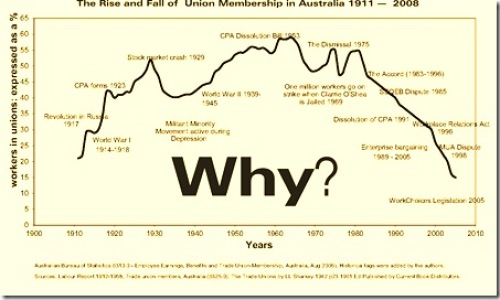The Rise and then the Fall by Ian Curr — Print friendly PDF
This year, 2008, everyone has been talking about the fall of the stock markets around the world — “more than a third wiped off the market” says the ABC’s finance pundit, Alan Kohler. “Australia is in recession, the market has spoken” he adds.

‘Is American Capitalism over?’ ask the newspapers.
Over the past 25 years there has been another decline that rarely makes the headlines.
After auspicious beginnings in the 1890s and up till the stock market crash of 1929 workers organisations made steady progress. Then there were the hard years of the depression.
The unemployed workers union and the militant minority. Workers carrying their swags from town to town. Both capitalism and worker hit skid row. Roosevelt introduced The New Deal in the USA but it failed when unemployment rose again. Only war could save the capitalists, and workers paid with their lives.
Still in the 30s a few got organised and by the 1950s and 1960s workers were back in the struggle with some mo dest gains on the waterfront, the building site and in the factory.
dest gains on the waterfront, the building site and in the factory.
Capitalism reached its peak.
Big mining and construction booms and jobs to go with it. For a while even wages kept pace with profits for a few short moments. Then Vietnam and the OPEC Oil crisis. Only wars could save the beast.
People lost faith.
They shot Martin Luther King after a garbage workers strike in the South.
A Bolivian army sergeant shot dead Che Guevara.
A death squad shot black leader Patrice Lumumber in the Congo.
US army Lt Calley’s men shot villagers at Mai Lai.
Pinochet killed Salvador Allende with the help of the CIA.
The racists killed Steve Biko and Chris Harney in South Africa — targeted killings were all the rage in the CIA — only Fidel Castro seemed able to elude the bullet.
Workers lost hope.
The pundits told us that Whitlam would wreck the economy. Yet it was capitalism not Gough that bought stagflation, with high inflation and high unemployment.
Our union leaders accepted the current wisdom and found refuge in economic rationalism. They took the U out of Labour. Bureaucrats even took over the Builders Labourers Federation from Jack Mundey. Still not enough. So Hawke outlawed the Builders Labourers.
Meanwhile developers built freeways and high-rise in the cities.
Men-in-suits stole even more land from Murris and Kooris and Nungas so the Big Australian could mine under the smokescreen of Native Title.
Meanwhile the Accord and Enterprise Barganining kept the workers in line.
The bosses were back on top.
The Wharfies fought back briefly and the toffs jailed Craig Johnston.
The jihadis killed thousands of workers in the twin towers and it was back to war.
The CIA have resumed their old standby — targeted killings were back in Baghdad, Beirut, Pakistan, Gaza and Kabul.
 And they give the workers bigger bills for fuel, food and housing.
And they give the workers bigger bills for fuel, food and housing.
So last week the ALP government put the unions out in the cold with ‘Forward with Fairness’.
So how to fightback?
Answers are hard to come by.
Read After the Waterfront – the workers are quiet and let us know what you think.
Ian Curr
Ph: 07 3398 5215
Email: iancurr@optusnet.com.au
Web: Workers BushTelegraph

Anyway here are the links they sent around on the WorkLife list.
A tsunami of hope or terror?
COMMENTARY BY ALAN KOHLER: If the number of defaults of corporations listed in synthetic CDOs reaches nine, there will be a mass transfer of funds from investors into the banking system.
This could tip us into global depression or, miraculously, end the crisis at a stroke. 19 Nov 2008 7:28 AM read more …http://www.businessspectator.com.au/bs.nsf/Article/A-tsunami-of-hope-or-terror-LHRJP?OpenDocument&src=stf
See also http://www.atimes.com/atimes/Global_Economy/JK19Dj04.html
http://www.atimes.com/atimes/Global_Economy.html
http://www.atimes.com/atimes/South_Asia/JK19Df01.html
Infamous Victory:
Ben Chifley’s Battle For Coal
Channel: ABC1
Thursday, 6 November 2008 – 8:30pm
TV, G, Documentary
(2008)
60 minutes
This is a story of coal, communism, and the Australian prime minister who went to war against his own during the national miners’ strike of 1949.
Using rare archival footage and re-creations, this dramatised documentary takes us into the corridors of power to show how Labor Party leader Ben Chifley took on and defeated the growing forces of communism in Australia.
This program explains the complex issues that the conflict raised and introduces the major players in the dispute, including Attorney-General Evatt, Immigration Minister Arthur Calwell, Chifley’s “spin doctor” Lloyd Ross and his brother Edgar Ross – a Communist Party executive and driving force behind the strike [Editor’s Note — I have my doubts about this comment. The CPA’s position on the strike was not as clear as the promotional blurb states. Edgar Ross always disputed the ABC’s account in previous docos].
It portrays a fascinating era of Australian history. A former train driver from Bathurst, Chifley was a working-class hero, a Labor Party icon and “man of the people”. But his actions flew in the face of Labor values and tradition when he believed they were in the interests of post-war Australia.
Chifley introduced draconian laws to prevent unions accessing funds to support the strike and sent in the army to replace striking miners – so defeating the Communist Party leadership that controlled the militant union. It was a battle he was determined to fight and win in the interests of the nation, despite knowing it would probably cost him government.
This article is also related to the topic and has been quite popular on my blog.
http://militantworker.wordpress.com/2008/09/15/young-workers-and-trade-unions-in-australia/
Cheers
See also “Exploitation leads to over-consumption” by Humphrey McQueen http://bushtelegraph.wordpress.com/2008/09/23/the-rise-and-then-the-fall/
See Mount Isa, the story of a dispute / by Pat Mackie with Elizabeth Vassilieff.
@ http://www.takver.com/history/mountisa1964.htm